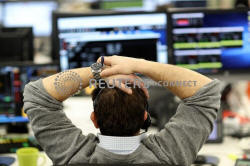Sino-U.S. spat over Hong Kong knocks world shares off
22-month high
 Send a link to a friend
Send a link to a friend
 [November 20, 2019] By
Sujata Rao [November 20, 2019] By
Sujata Rao
LONDON (Reuters) - World stocks were
knocked off 22-month highs on Wednesday as a flare-up in Sino-U.S.
tensions and the creeping return of U.S. recession fears fueled a bid
for bonds and other "safe" assets such as gold.
Wall Street futures were marked lower and European equities tumbled
0.8%, edging further off recent four-year highs hit when it had appeared
Washington and Beijing were about to agree the first phase of a trade
deal.
The mood in markets soured after the U.S. Senate angered China by
passing a bill requiring annual certification of Hong Kong's autonomy
and warning Beijing against suppressing protesters. China demanded the
United States stop interfering in its internal affairs and said it would
retaliate.
U.S. President Donald Trump also threatened to up tariffs on Chinese
goods if a trade deal is not reached soon.
"Markets have taken a bit of a wobble due to the talk about Hong Kong,
but they had rallied a lot in recent weeks on expectations of a (trade)
deal," said Salman Ahmed, chief investment strategist at Lombard Odier.

Ahmed said both sides needed a deal to be signed -- Trump cannot afford
a recession because of his re-election bid next year, while China's
economy is slowing markedly.
"I think we are looking at a short-term setback rather than a major
issue that would derail the process. The bill still has to be signed
into law by Trump so there's a high probability he will use it as
leverage against China."
MSCI's index of Asia-Pacific shares ex-Japan <.MIAPJ0000PUS> tumbled
0.7%, Japan's Nikkei <.N225> fell 0.8% and Shanghai blue chips <.CSI300>
lost 1%. MSCI's global index <.MIWD00000PUS> slipped 0.3%, ending a
three-day winning streak.
Wall Street futures were down 0.3%-0.4% <ESc1> <YMc1> <NQc1>
Analysts noted through that U.S. shares had closed just below record
highs on Tuesday, and world stocks are 0.5% off all-time peaks hit last
year.
"It was noticeable that fixed income markets rallied despite equity
markets being stable, suggestive of a market that remains cautious about
the growth outlook," ANZ told clients.
U.S. 10-year Treasury yields, which have fallen in six out of the past
seven sessions, slipped as much as 5 basis points to 1.73%, a 2-1/2
-week low <US10YT=RR>.
German bonds fell for the third straight day to touch a 2-1/2 week low
<DE10YT=RR>, shrugging off European Central Bank Chief Economist Philip
Lane's comment that the euro zone economy would not fall into a
recession.
"We have this classical risk-off trade taking place again," Rainer
Guntermann, a rates strategist at Commerzbank, said.
[to top of second column] |

A broker looks at financial information on computer screens on the
IG Index trading floor in London, Britain February 6, 2018.
REUTERS/Simon Dawson

THE R WORD
Commodity and bond market moves imply fears of economic recession may be
creeping back with Brent crude steadying after a 2.6% tumble, its biggest in
seven weeks <LCoc1>.
Japan's October exports fanned these fears, falling at their quickest rate in
three years while China cut lending rates to support growth which is near
30-year lows.
A marked flattening of the U.S. bond curve -- the gap between two-year and
10-year yields is at its narrowest in more than two weeks -- also hints at a
return of recession fears.
The curve inverted earlier this year, returning to normal only after three U.S.
interest rate cuts.
But Federal Reserve officials have hinted there will be no further easing for
now, a message the U.S. central bank may reiterate later in the day when it
releases minutes from its last meeting. Markets are now pricing in just a 0.8%
chance of a December rate cut <FEDWATCH>.
Dour forecasts from retailers Home Depot and Kohl's also fueled worries about
U.S. consumer spending, which has so far been robust, in contrast to
manufacturing.
"We've had a bit of topping out of the U.S. consumer in the past couple of
months," Lombard Odier's Ahmed said.
On currencies, the dollar nudged lower versus the yen to 108.4 <JPY=> but firmed
0.2% versus a basket of currencies <.DXY>. Sterling slipped 0.3%, pressured by
dollar strength and a better-than-expected performance by left-wing opposition
leader Jeremy Corbyn in pre-election TV debates.

But sterling and UK domestic stocks <.FTMC> remain supported by opinion polls
showing a hefty lead for Prime Minister Boris Johnson's ruling Conservatives,
viewed by some as more market-friendly.
If the Conservatives win a majority on Dec. 12, expectations are parliament
would approve the Brexit deal Johnson agreed with Brussels last month and
Britain would exit the European Union on Jan. 31, ending three-and-a-half years
of uncertainty.
(Additional reporting by Wayne Cole in Sydney; Dhara Ranasinghe and Saikat
Chatterjee in London; Editing by Catherine Evans)
[© 2019 Thomson Reuters. All rights
reserved.] Copyright 2019 Reuters. All rights reserved. This material may not be published,
broadcast, rewritten or redistributed.
Thompson Reuters is solely responsible for this content. |